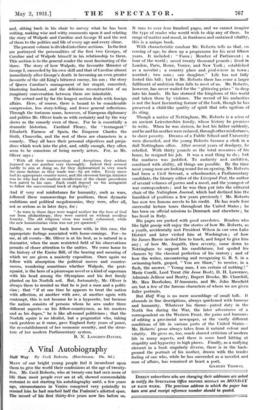A Vital Autobiography Half Way. By Cecil Roberts. (Hutchinson. 10s.
(Id.) MANY of our bright young people feel it incumbent upon them to give the world their confeisions at the age of twenty- five. Mr. Cecil Roberts, who at twenty-one had seen more of life than most people ever see at all, .showed commendable restraint in riot starting his autobiography "until; a few years ago, eircumstanees in Venice conspired Very pointedly to remind him he had reached half the Psalmist's allotted span. The record of his first thirty-five years now lies before us.
It runs to over four hundred pages, and we cannot imagine the type of reader who would wish to skip any of them. In range of matter and mood, in frankness and sustained vitality, this is a unique book.
With characteristic candour Mr. Roberts tells us that, on coming of age, he drew up a programme for his next fifteen years. It included : " Fame ; Member of Parliament ; a tour of the world ; saved twenty thousand pounds ; lived in London, Paris, Rome, Venice, and New York ; established as a novelist ; a country place and pied-a-terre in town; married ; two sons ; one daughter." Life has not fully footed this bill ; but to Mr. Roberts there has come a larger fulfilment of ambition than falls to most of us. Mr. Roberts, however, has never waited for the "glittering prizes" to chop into his hands. He has stormed the kingdoms of this world and taken them by violence. The record of his audacities is not the least fascinating feature of the book, though he has preserved a child-like quality of spirit that robs egotism of its sting.
Though a native of Nottingham, Mr. Roberts is a scion of
an ancient Leicestershire family, whose history he promises to write. When he was sixteen, he lost his father suddenly, and he and his mother were reduced, through other misfortunes, to sheer poverty. Dreams of a Public School and University were discarded, and the young Roberts became a clerk in a dull Nottingham office. After several years of drudgery, he rebelled. With thirty rounds as the total resources of his home, he resigned his job. It was a mad thing to do ; but the madness was justified. To audacity and ambiticn, combined with ability, all things are possible. By the time most young men are looking round for an opening, Mr. Roberts had been a Civil Servant, a schoolmaster, a Parliamentary candidate, the literary editor of the Liverpool Post, the author of several volumes of poems and a novel, and the youngest of war correspondents ; and he was then put into the editorial chair of the Nottingham Journal, which had declined him the humblest Of- positions a few years previously 1 Mr. Roberts has now ten famous novels to his credit. He has made four successful lecture tours throughout the United States ; he has been on official missions to Denmark and elsewhere ; he has lived in Italy.•
His pages are packed with good anecdotes. Readers who
like light gossip will enjoy the stories of how Mr. Roberts, as a-youth, accidentally met President Wilson in our own Lake District' and later' visited him at Washington ; of how Sir James Barrie invited him to lunch, and forgot to give him any; of -how Mr. Asquith, then seventy, came down to Nottingham to support his candidature, but spoiled his chances by the classical perfection of his oratory; and of how the writer, encountering and recognizing G. B. S. in a Swimming-bath, gasped, "You are Shaw,." to receive, in a flash, the answer, "Young man, I am certain of nothing ! " Marie Corelli, Lord Trent (Sir Jesse Boot), D. H, Lawrence, Admirals Jellicoe and Beatty, Rupert Brooke, Mr. Churchill, Mr. Max Beerbohm, D'Annurizio, and Mr. John Masefield are but a few of the famous characters of whom we are given fuller 'portraits.
But Half Way is no mere assemblage of small talk. It abounds in fine descriptions, always quickened with hinnour and humanity. Whatever his theme—patrol duty in the North Sea during the War, the later adventures of a correspondent on the Western Front, the pains and humours of editing a provincial newspaper, or the vastly different conditions of life in various parts of the United States— Mr. Roberts' prose always takes from it natural colour and vitality. He gives us, too, much shrewd criticism of modern life in many aspects, and there is some hard hitting at stupidity and hypocrisy in high places. Finally, as a unifying element in a book singularly diverse, there is in the back- ground the portrait of his mother, drawn with the tender feeling of one who, while he has succeeded as a novelist and man of affairs, has remained at heart a poet.
GILBERT THOMAS.




































 Previous page
Previous page